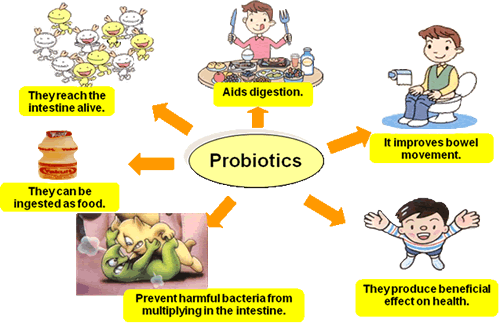by Kelly R. Smith
|

This article was updated on 10/26/20.
Everywhere we turn nowadays we hear about probiotics. But what about prebiotics and synbiotics? Actually, they all work hand in hand. Here’s the rundown.
- Probiotics. WebMD says, “Probiotics are live bacteria and yeasts that are good for you, especially your digestive system. We usually think of these as germs that cause diseases. But your body is full of bacteria, both good and bad. Probiotics are often called ‘good’ or “helpful” bacteria because they help keep your gut healthy.” When you lose the “good” bacteria that inhabit your gut, after you take antibiotics for example, probiotics can help replace them. The two main types are lactobacillus and bifidobacterium. You can get them through dairy and supplements.
- Prebiotics. The Mayo Clinic tells us, “Prebiotics are specialized plant fibers. They act like fertilizers that stimulate the growth of healthy bacteria in the gut.” They are found in a variety of fruits and vegetables, mostly those that are rich complex carbohydrates, such as fiber and resistant starch. These carbs aren’t digestible by your body, so they pass through the digestive system to become food for the bacteria and other microbes. When your balance is off it can affect your metabolism.
- Synbiotics. ScienceDirect says, “Synbiotics are a combination of prebiotics and probiotics that are believed to have a synergistic effect by inhibiting the growth of pathogenic bacteria and enhancing the growth of beneficial organisms.” Evidence suggests that synbiotics influence the microbial ecology in our intestines. This is true in both humans and animals and synbiotics play a role in alleviating various illnesses.
Knowing what we know about prebiotics, probiotics, and synbiotics it becomes clear that we should maintain our diet with various types of foods in mind, organic whenever possible. This includes milk, cheese, fermented foods like kimchi and kombucha, whole grains, miso, fruits, and vegetables.
Benefits of Probiotics
- Improves immune function. They assist in the treatment and/or prevention of many common conditions. Some of these include diarrhea, irritable bowel syndrome, ulcerative colitis, and Crohn’s disease.
- Protects against hostile bacteria to prevent infection. Under normal (balanced) conditions, your friendly bacteria in your gut outnumber the unfriendly ones. Probiotics stand duty as gut-beneficial bacteria that create a physical barricade against legions of unfriendly bacteria.
- Improves digestion and absorption of food and nutrients.
- Counters the negative effects of antibiotics. When you contract a bacterial infection, antibiotics are most often prescribed to as the immediate solution. That’s a Godsend, but unfortunately, nothing good comes free, and antibiotics kill bacteria arbitrarily, decimating both good and bad bacteria in your intestinal tract. By eliminating beneficial bacteria, your body is susceptible to a number digestive issues. Myself, when I go to the grocery store to have an antibiotic prescription filled, I also stock up on yogurt with active cultures.
- Boosts heart health.
- Lowers cholesterol. Probiotics contain bacteria that are effective in lowering total and LDL (bad) cholesterol. Taylor Francis Online says, “Numerous clinical studies have concluded that BSH-active probiotic bacteria, or products containing them, are efficient in lowering total and low-density lipoprotein cholesterol.”
Others are reading:
- Should Runners and Others Supplement with CoQ10?
- 10 Bad Habits That Result in a Slow Metabolism
- Covid-19 Lock-down Homemade Whole Wheat Bread Recipe
- Why Pandemics Like COVID-19, or Coronavirus Persist
- Intermittent Fasting – a Beginner’s Guide to Weight Loss
References
Looking for more great content? Visit our main site I Can Fix Up My Home or our partner sites:
I offer article and blog-writing services. Interested? Contact me for a quote!
Visit Kelly’s profile on Pinterest.
About the Author:
 Kelly R. Smith is an Air Force veteran and was a commercial carpenter for 20 years before returning to night school at the University of Houston where he earned a Bachelor’s Degree in Computer Science. After working at NASA for a few years, he went on to develop software for the transportation, financial, and energy-trading industries. He has been writing, in one capacity or another, since he could hold a pencil. As a freelance writer now, he specializes in producing articles and blog content for a variety of clients. His personal blog is at I Can Fix Up My Home Blog where he muses on many different topics.
Kelly R. Smith is an Air Force veteran and was a commercial carpenter for 20 years before returning to night school at the University of Houston where he earned a Bachelor’s Degree in Computer Science. After working at NASA for a few years, he went on to develop software for the transportation, financial, and energy-trading industries. He has been writing, in one capacity or another, since he could hold a pencil. As a freelance writer now, he specializes in producing articles and blog content for a variety of clients. His personal blog is at I Can Fix Up My Home Blog where he muses on many different topics.





Probiotics can be expensive. Yogurt for me.